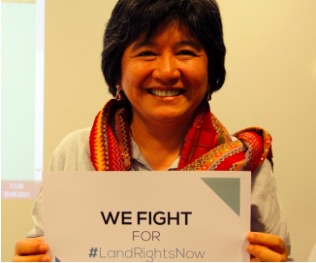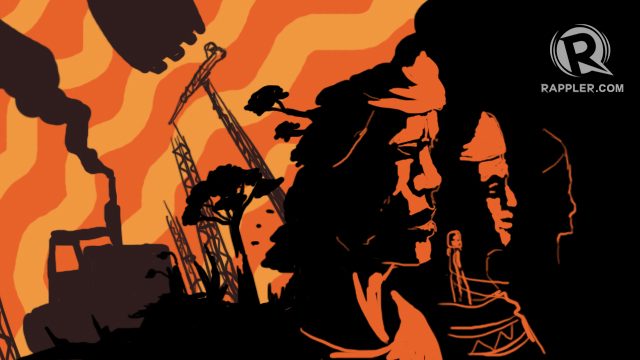SUMMARY
This is AI generated summarization, which may have errors. For context, always refer to the full article.
 The world’s remaining forests, the planet’s biodiversity, and rivers are found in indigenous peoples’ territories. However, rampant large-scale development projects without regard to the environment and the indigenous peoples inhabiting these areas are threatening to wipe out populations and extract resources.
The world’s remaining forests, the planet’s biodiversity, and rivers are found in indigenous peoples’ territories. However, rampant large-scale development projects without regard to the environment and the indigenous peoples inhabiting these areas are threatening to wipe out populations and extract resources.
In order to address climate change, combat deforestation, and achieve Sustainable Development Goals (SDGs), the Asia Indigenous Peoples Pact (AIPP) stresses on the need to recognize the collective land rights of indigenous peoples. (READ: Climate, forests, and peoples)
On the occasion of International Day of Forests, we call on the representatives of indigenous peoples, civil society organizations, and governments to actively support and participate in the global call to action on indigenous and community land rights to double by 2020 the global area of land legally recognized as owned or controlled by indigenous peoples and local communities.
Climate change and deforestation
In Asia, indigenous peoples, including women, have been sustainably managing natural resources through customary laws and sustainable resource management practices.
In Malaysia, indigenous peoples practice a traditional system known as “Tagal” to manage and promote sustainable use of rivers, forests, and watersheds. In Indonesia, indigenous peoples have customary rules known as “Sasi law” to manage natural resources including seas and rivers.
The protection and promotion of these traditional systems are crucial in the fight against climate change, deforestation and water pollution. Our rivers and lands are expropriated for dams without free, prior and informed consent (FPIC).
In India, indigenous peoples represent at least 40% of the people displaced by development projects including large dams. Only recently in Manipur, Northeast India, despite the local and global protest against the construction of the Mapithel Dam, the Thoubal and the Barak rivers continue to be blocked for the completion of the dam project. It submerged thousands of hectares of agricultural land, forest areas and grazing grounds, causing untold hardship on villagers.
The protection and promotion of these traditional systems are crucial in the fight against climate change, deforestation and water pollution.
In 2011, the Bakun Dam in Sarawak displaced 10,000 indigenous peoples and flooded 700 square kilometers of land. At least 12 dams being planned along traditional lands of indigenous peoples in Sarawak will create adverse cultural, economic, and environmental impacts.
The plan of the governments of Laos, Cambodia, Thailand, and Vietnam to build 11 large dams on the Lower Mekong River will displace around 106,000 people, destroy the river’s rich biodiversity, and threaten food security of millions of people.
In northeastern Cambodia, hundreds of indigenous peoples are resisting the Lower Seasan 2 dam that threatens communities’ livelihoods, food security, cultural practices and beliefs.
Dams are not ‘clean and green’
The classification of dams as a clean and green energy has sparked a race to build at least 200 dams across Asia.
There should be moratorium to all proposed dams. Any plans for our rivers and lands must undergo a consultation process based on our right to FPIC as stipulated in the UN Declaration on the Rights of Indigenous Peoples (UNDRIP).
Forests are the lifeline and cultural heritage of at least 100 million indigenous peoples in Asia. Criminalization of sustainable practices, eviction and threats of eviction from forestlands to give way to, among others, economic land concessions, national parks, tiger reserves, and other extractive industry projects continue among indigenous communities.

In Thailand, indigenous Karen people were evicted from Kaeng Krachan National Park in 2011.
In Central India, more than 200 Gond tribals in Madhya Pradesh State are facing serious threat of forced evictions from their lands for expansion of Panna Tiger Reserve.
In India, there are attempts to dilute the landmark legislations and acts, especially on the need to get consent from Gram Sabha for use of forestlands.
Despite the decisions of the Supreme Court and the Union Ministry of Environment, Forest, and Climate Change that are in favor of indigenous peoples, the Odisha state government is attempting again to facilitate the entry of bauxite mining in the sacred Niyamgiri Hills of Dongaria Kondh, Kutia Kandha, and other tribal communities. This undermines the earlier decision of 12 Gram Sabhas opposing the entry of the said mining project.
‘Land Rights Now’ campaign
Indigenous leaders and activists who are defending and protecting their lands and forests are being threatened, harassed, and killed. In the Philippines, a pregnant member of the B’laan community in South Cotabato was killed along with her two sons, for her opposition to a large-scale mining project in 2002.
Since 2010, around 56 indigenous Lumad leaders and environmental activists fighting against large-scale mining projects have been murdered in Mindanao alone.
The Land Rights Now campaign, with over 300 participants, organizations and communities, seek to secure the rights to build a just and equitable world while protecting our forest and water resources.
In Thailand, indigenous human rights defender, Pholchi Rachongcharoen, who had been actively fighting for the rights of 500 indigenous Karen villagers residing in Kaeng Krachan National Park, went missing on April 17, 2014. His whereabouts are still unknown to this day.
This madness of grave human rights violations of indigenous peoples shall be stopped right away. The governments should take actions against perpetrators and respect and implement all provisions enshrined in the UNDRIP and UN Declaration on Human Rights Defenders (UNDHRD).
This global problem requires global action. The Land Rights Now campaign, with over 300 participants, organizations and communities, seek to secure the rights to build a just and equitable world while protecting our forest and water resources. Take action on International Forests Day by signing on the Land Rights Now campaign here. – Rappler.com
Joan Carling, Asia Indigenous Peoples Pact secretary general, belongs to the Kankanaey, Igorot tribe from the Cordillera region in the Philippines. She has been appointed by the UN Economic and Social Council (ECOSOC) as an indigenous expert-member of the UN Permanent Forum on Indigenous Issues (UNPFII) for 2014-2016.
Add a comment
How does this make you feel?
There are no comments yet. Add your comment to start the conversation.